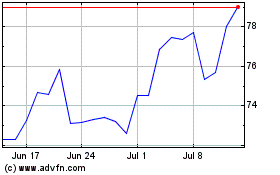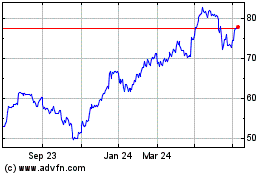By Robert Wall
LONDON -- There is no Plan B.
That is what many companies across Europe have been telling
investors since Britain voted to leave the European Union. The exit
and its timing are so uncertain, executives say, that few companies
had any meaningful contingency plans to either defend against the
fallout or take advantage of the opportunity.
"I can't even assess the impacts this could have on us in
operational terms," says Maurizio Focchi, chief executive of
Focchi, a family-controlled Italian construction company with about
90% of its revenue in the U.K. Almost 70% of German firms surveyed
by the Federation of German Industries, or BDI, ahead of the vote
said they didn't know how they would react to a Brexit vote.
Vodafone Group PLC says the vote means it might have to move its
headquarters from Newbury, England, to somewhere else in Europe. It
also might not. It is "not yet possible to draw any firm
conclusions," the company said last week.
"My message to my investors," says Michael O'Leary, chief
executive of Ryanair Holdings PLC, Europe's biggest airline by
passengers flown, "is don't ask me for what this means, because we
don't know."
Any big election brings uncertainty for businesses. None in
recent years has raised so many questions for corporations, over
such a broad swath of industries and geography, as last month's
vote by Britain to leave the EU. In the short term at least, that
has paralyzed planning and investment in boardrooms across the
continent.
Negotiations about how Britain will disentangle itself from the
EU could last as long as two years and might not start until next
year. The talks could maintain the status quo or radically alter
Britain's relationship with the European common market.
Cie. de Saint-Gobain SA, a French maker of construction
materials with large operations in the U.K., hadn't made plans for
a possible Brexit because the timing and scope of any impact are
impossible to pin down, said Chief Executive Pierre-André de
Chalendar.
While many bigger firms opposed Brexit, many smaller British
business owners said a break from Brussels would allow them to
thrive unencumbered by EU regulations.
Emma Pullen, chief executive of British Hovercraft Co., a
manufacturer of small hovercrafts near Sandwich, England, said
there will be short-term uncertainties, but the vote was great news
longer term. Her own contingency plan: She gave all 15 of her
employees a paid holiday to celebrate.
In the immediate aftermath, no sector outside of finance has
been convulsed more than airlines.
More than 70% of flights taking off or landing at British
airports are international ones, with 53% of those on average bound
for other EU countries, according to consultant Oliver Wyman.
Ryanair and rivals with major hubs in Britain, including easyJet
PLC and British Airways parent International Consolidated Airlines
Group SA, are especially vulnerable.
Investors have punished the sector. On Monday, Ryanair shares in
London were down 15.6% since the June 23 vote. EasyJet was off
29.5% and IAG was down 29%.
The falling pound threatens to boost costs of new planes and
fuel, which are usually purchased in dollars. Most airlines hedge
currency exposure, though that would only defer the pain if the
pound's weakness is prolonged. The biggest long-term worry for the
industry is how a split might affect years of harmonized rules and
regulation governing civil aviation across Europe.
Mr. O'Leary, Ryanair's chief executive since 1994, called it the
worst industry shock since the terror attacks of Sept. 11, 2001.
Before going to bed the night of the vote, he authorized one of the
steepest, recent fare sales at Ryanair.
Mr. O'Leary said the question of future traffic rights -- where
and how frequently Ryanair can land at British airports -- is a big
uncertainty. That makes planning for U.K. expansion impossible.
Shortly after the vote he said he was unlikely to move any of the
50 new jets Ryanair is putting into service next year in the
U.K.
As an Irish-based company, Ryanair may need to get a new air
operator certificate, or AOC, from Britain, should the country
leave the EU. The certificate is an internationally recognized
permit granted to an airline that demonstrates it can fly safely.
Airlines need a second license certifying they are financially
healthy.
The British government last week postponed a politically charged
decision on how to address a looming airport-capacity shortage in
London. It cited the Brexit vote.
At rival easyJet, Chief Executive Carolyn McCall had a slightly
more detailed Plan B. The budget carrier is based at a small
airport in Luton, England, about an hour's drive from London. It is
the hub of a sprawling European network. About 43% of its flights
are outside the U.K.
Early Friday after the vote, Ms. McCall reached out to staff and
made calls to investors. She had prewritten letters ready to ship
off to European and British aviation regulators, urging them to
quickly draft air regulations that a split would require.
Minutes after British Prime Minister David Cameron announced his
plans to resign, Ms. McCall issued a statement aimed at easing
investor concern.
British Airways' parent IAG took more drastic action. Ahead of
the vote, Chief Executive Willie Walsh had avoided staking out a
public position for the airline. Privately, he said, Brexit would
be bad for business generally, but wouldn't materially affect IAG
operations.
That changed June 24. Midmorning, IAG warned earnings growth
would fall short of forecasts. Business travel, one of IAG's
biggest profit drivers, had slowed significantly in the run-up to
the referendum, the airline said. The vote's outcome made an
expected recovery uncertain.
The following Monday, easyJet issued its own profit warning. For
months, Ms. McCall had been talking informally to several other EU
member countries about the airline's biggest problem in the event
of a Brexit: It may need to set up an additional European
headquarters somewhere besides Britain to allow it to hold on to
its EU traffic rights.
In recent days, the company said, Ms. McCall's informal talks
over a new European home have become formal ones.
--Manuela Mesco, Inti Landauro and Alex MacDonald contributed to
this article.
Write to Robert Wall at robert.wall@wsj.com
(END) Dow Jones Newswires
July 04, 2016 17:10 ET (21:10 GMT)
Copyright (c) 2016 Dow Jones & Company, Inc.
Cie de SaintGobain (EU:SGO)
Historical Stock Chart
From Mar 2024 to Apr 2024

Cie de SaintGobain (EU:SGO)
Historical Stock Chart
From Apr 2023 to Apr 2024
